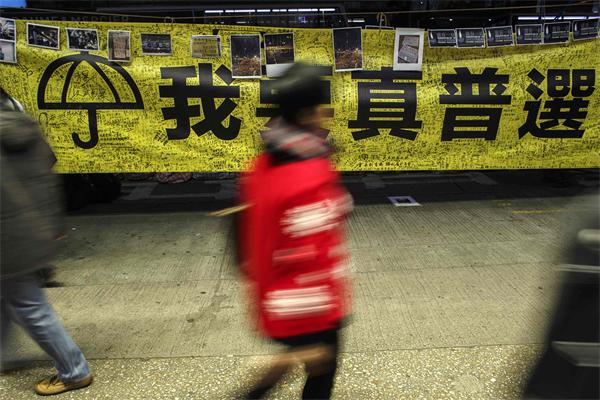Milestone for HK democracy
Updated: 2015-04-23 07:52
(China Daily)
|
|||||||||||
 |
|
People walk past a banner written by pro-democracy protesters at the area occupied by protesters at Causeway Bay in Hong Kong December 14, 2014. Banner reads "I want real universal suffrage". [Photo/Agencies] |
By tabling a draft resolution on its electoral reform blueprint in the Legislative Council on Wednesday, the government of the Hong Kong Special Administrative Region has taken another crucial step toward realizing universal suffrage in the city.
Democracy eluded Hong Kong during its one-and-a-half-century colonial era. All of its 28 colonial governors throughout those decades were appointed by the British monarch, who had the exclusive power to appoint the members of the colonial legislature.
Implementing the reform would mean in the space of merely 20 years - between 1997 and 2017 - Hong Kong would have moved from having a British governor "parachuted in" by the British monarch to a leader chosen by its 5 million eligible voters.
Selecting the chief executive by "one person, one vote" is the common aspiration of the central authorities, the SAR government, as well as the people of Hong Kong. For this aspiration to become reality, the SAR government needs to secure the endorsement of its electoral reform plan by the opposition lawmakers.
Unfortunately, the opposition lawmakers, who enjoy a critical minority in the legislature, reiterated on Wednesday their vow to veto the government's electoral reform blueprint. They insisted that the proposed package, which is in conformity with the Basic Law and the legal framework laid down by the Standing Committee of the National People's Congress on Aug 31 last year, did not meet "international standards".
But such standards are purely academic. The NPCSC's legal framework, designed specifically in the context of Hong Kong as a special administrative region of China under the "One Country, Two Systems" policy, is in keeping with the reality of the city. It is intended to help maintain the SAR's social stability and prosperity by ensuring that it is run only by patriots. A veto by the opposition lawmakers might serve the interests of some quarters of society, but it would not be in Hong Kong's overall interests.
Failure to push through the electoral reform plan would create a toxic political environment that would only make it impossible for the SAR government to restart the process for constitutional reform anytime soon.
Related Stories
Central govt says HK universal suffrage package 'legal', 'practical' 2015-04-22 13:37
HK reveals universal suffrage package for 2017 leader 2015-04-22 11:25
HK students need to have more confidence in themselves 2015-04-21 07:50
Fund: HK stocks still attractive options 2015-04-18 08:12
Today's Top News
Britain celebrates Queen Elizabeth II 's 89th birthday
Cuban FM visits France over relations
Auschwitz bookkeeper goes on trial in Germany
Russia willing to restore relations with Kiev: Putin
Asian markets jumpstart UK car industry
Smog magnifies staffing woes for EU firms
Silk Road initiatives to connect people's hearts
AIIB to operate in 'transparent way'
Hot Topics
Lunar probe , China growth forecasts, Emission rules get tougher, China seen through 'colored lens', International board,
Editor's Picks

|

|

|

|

|

|






